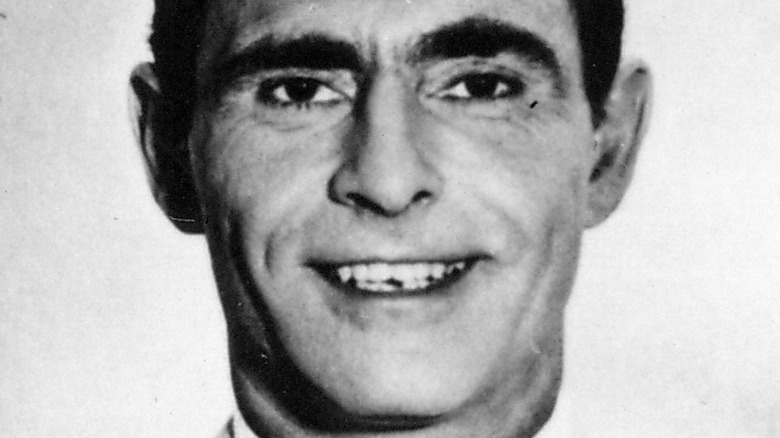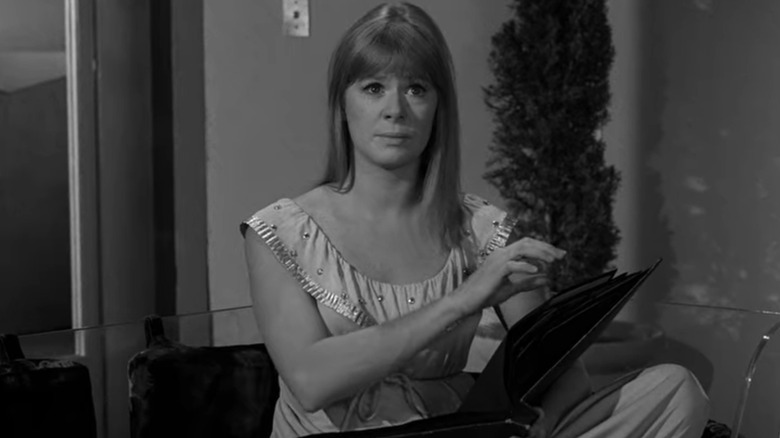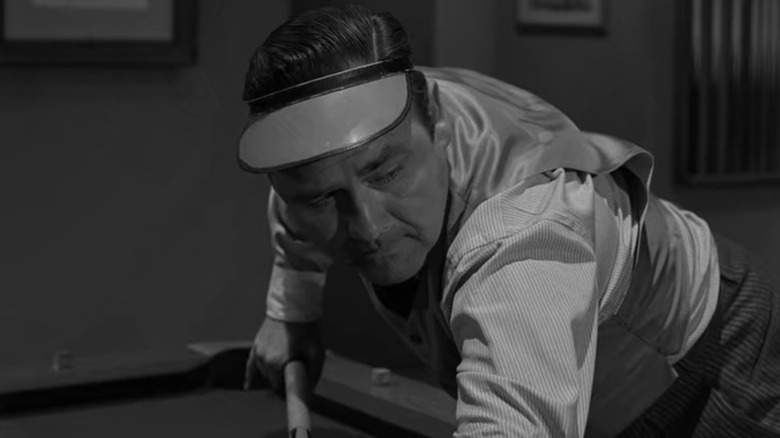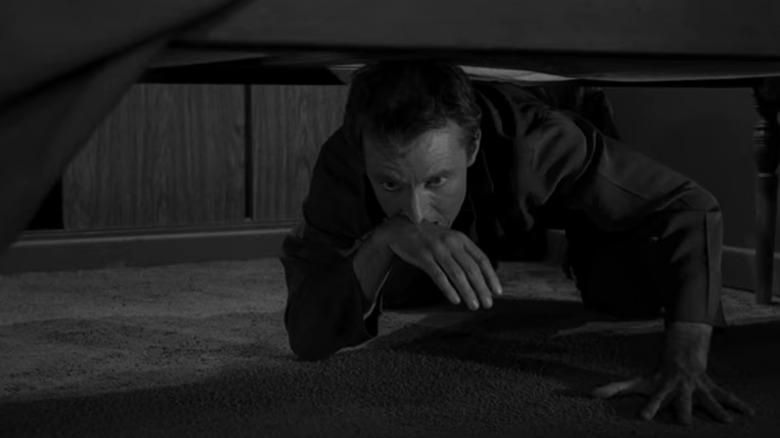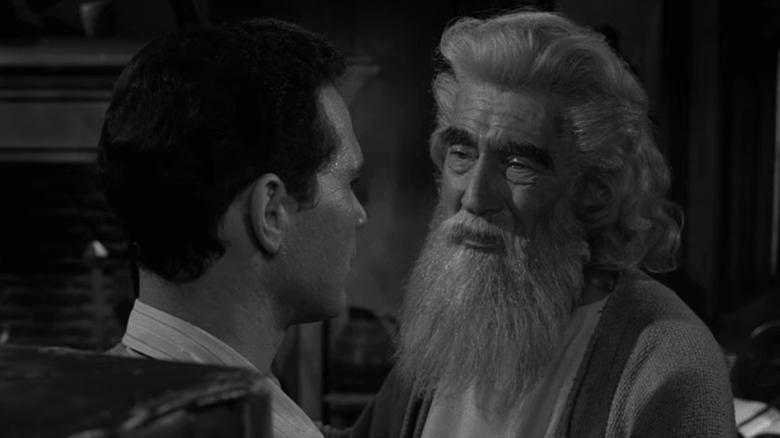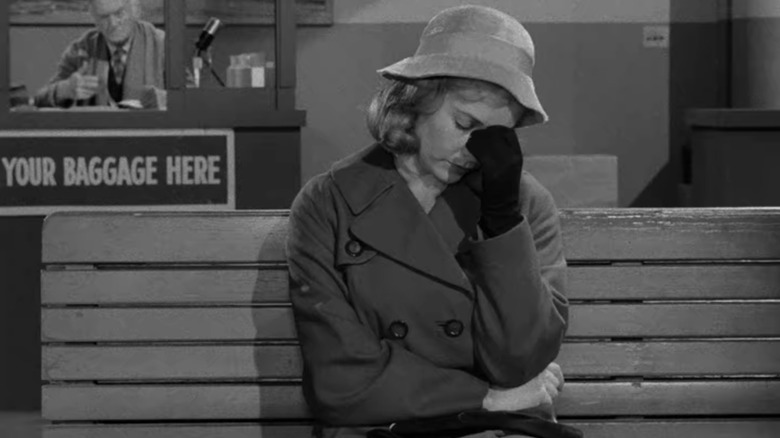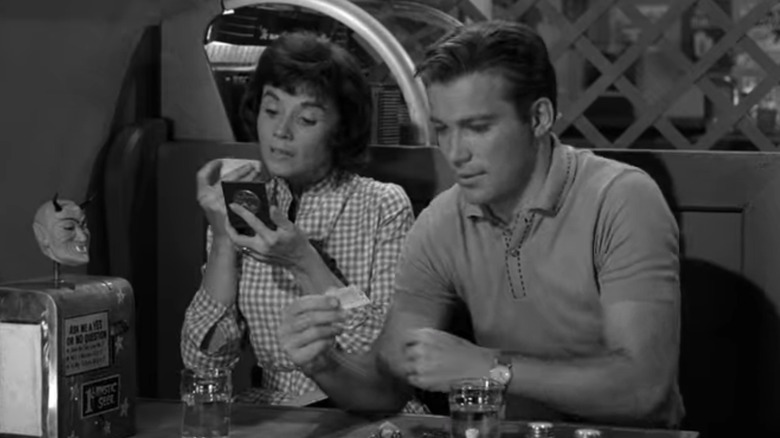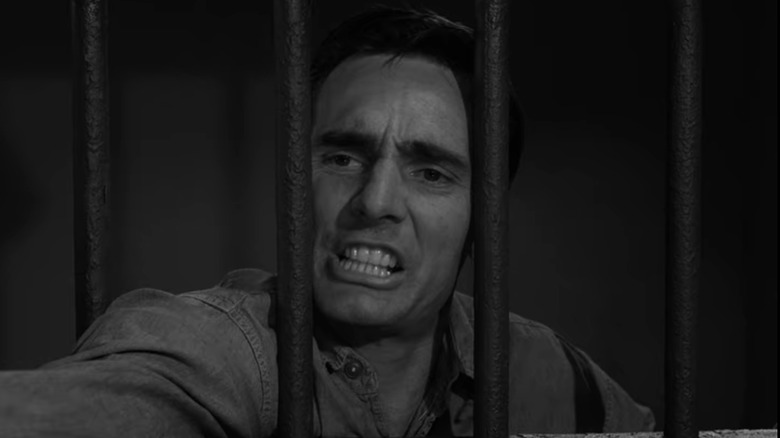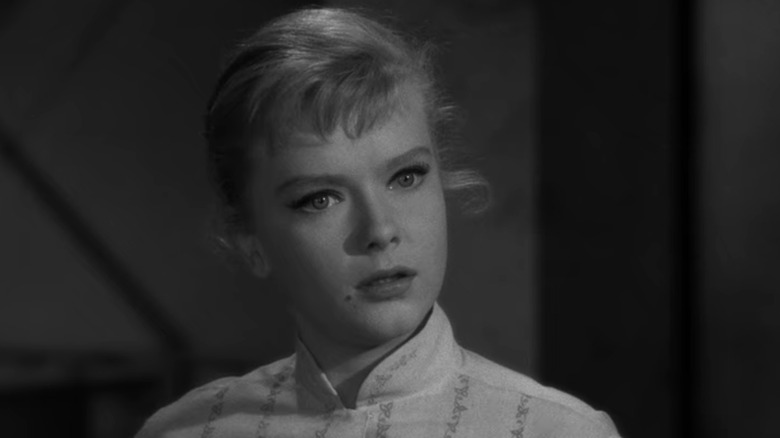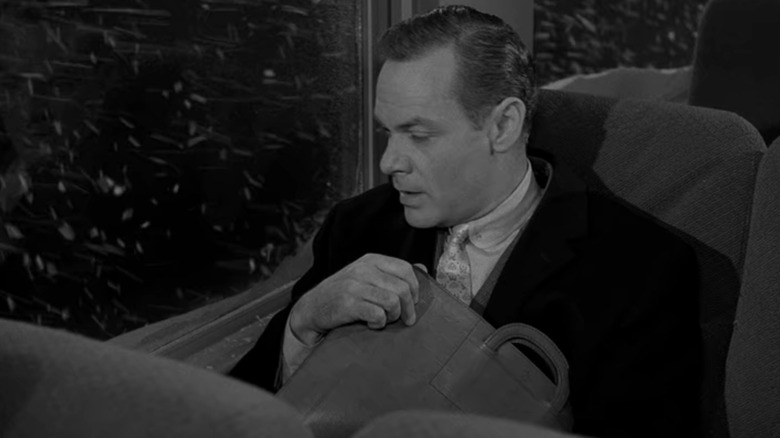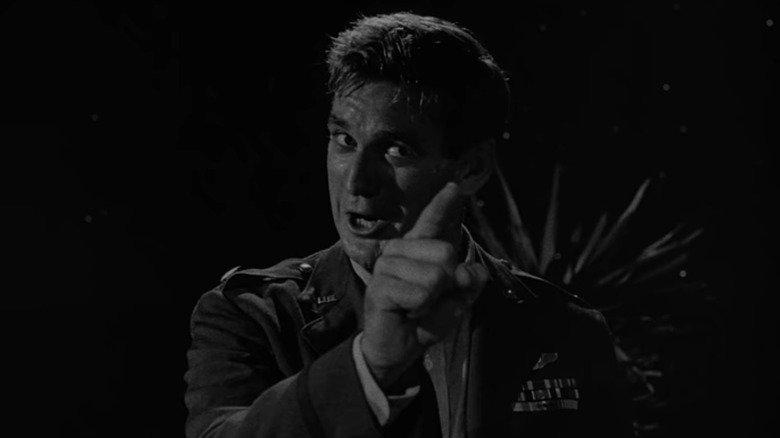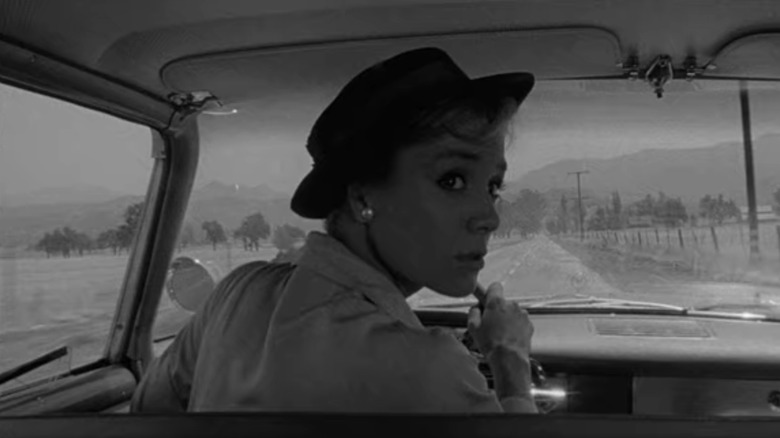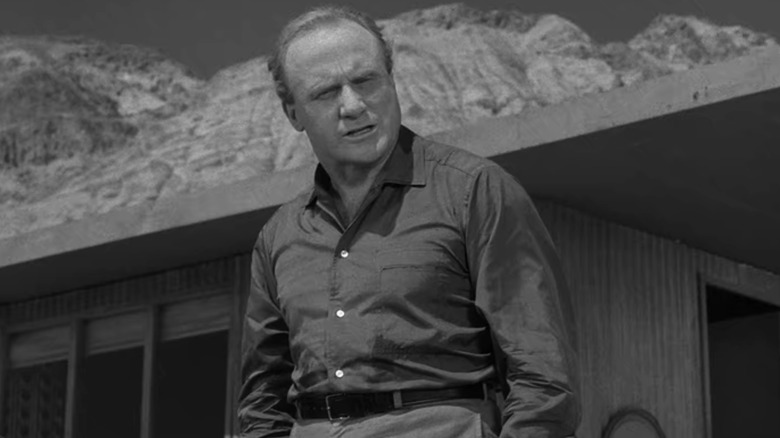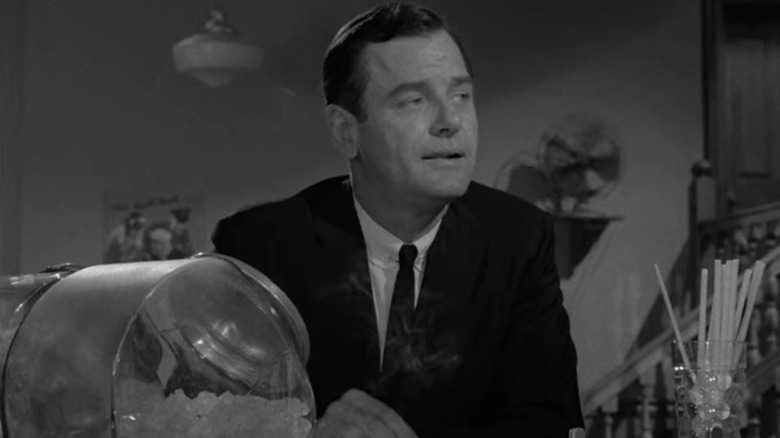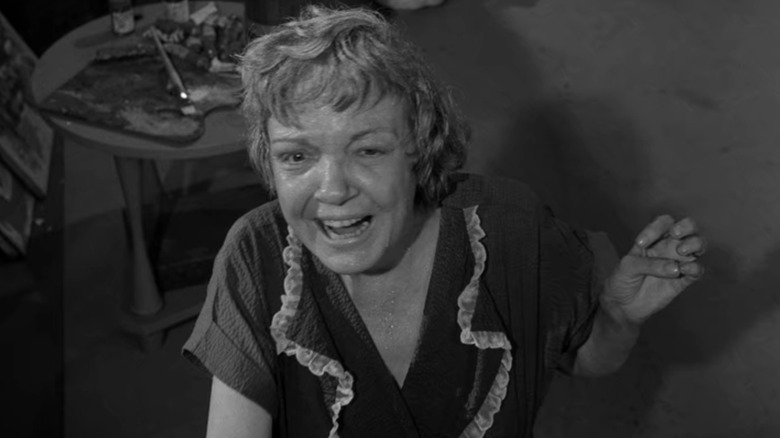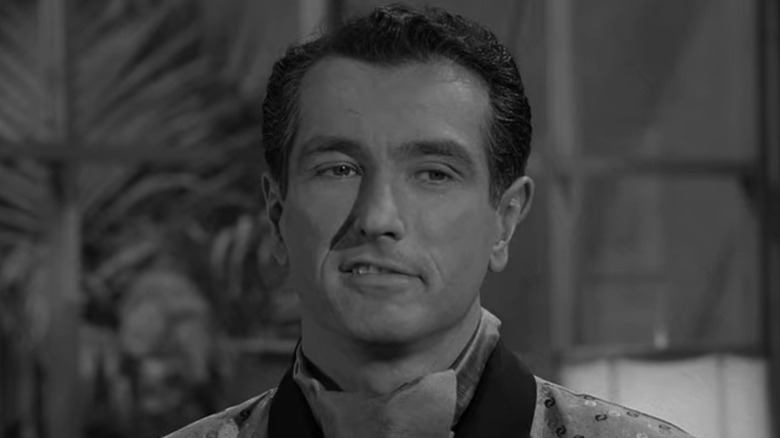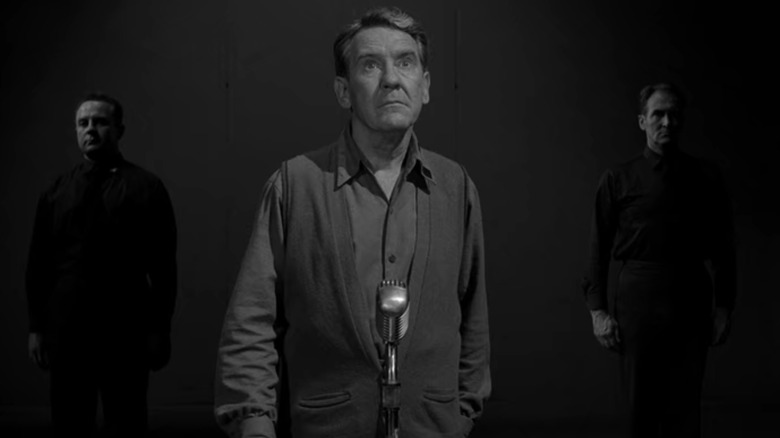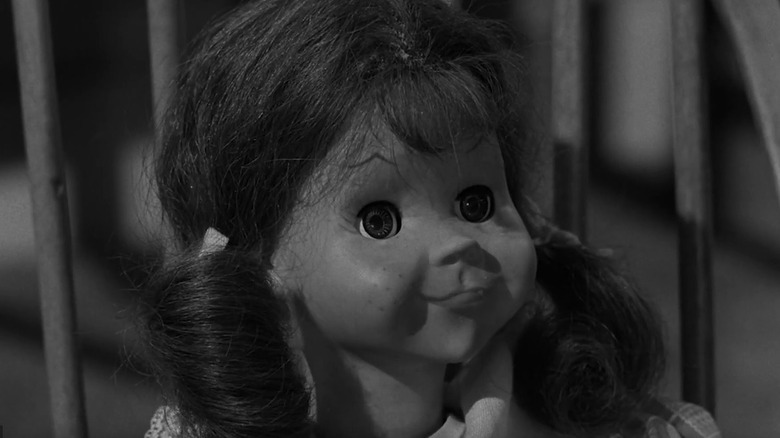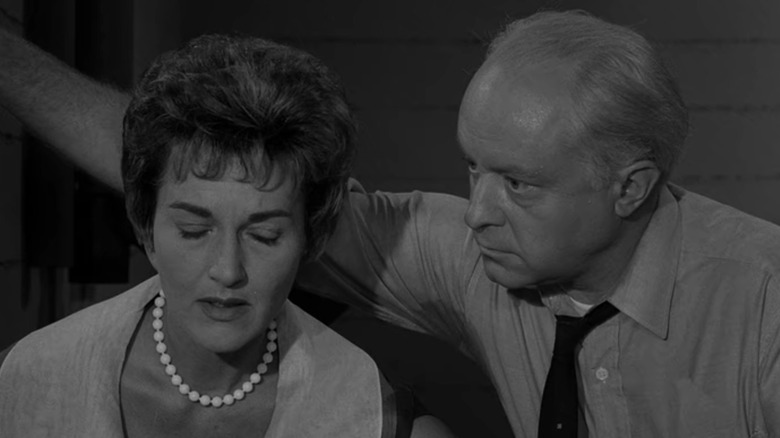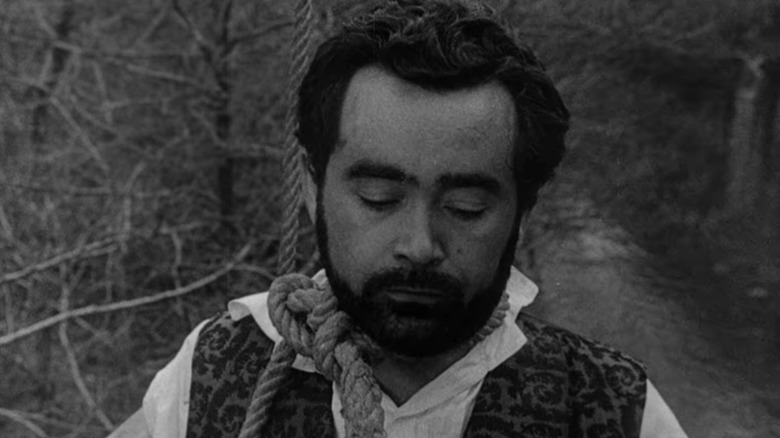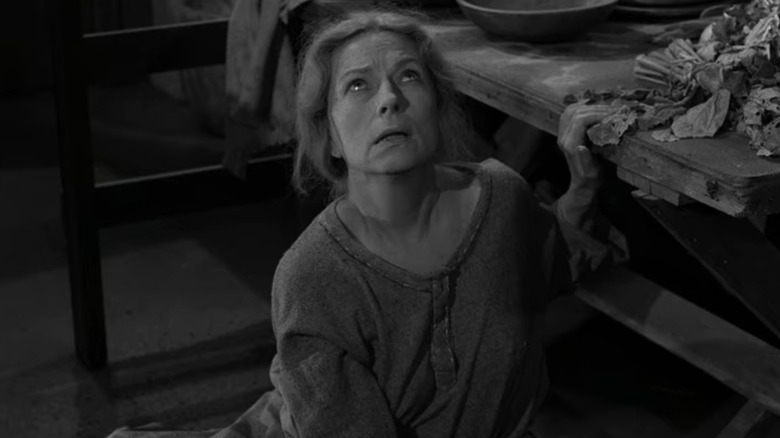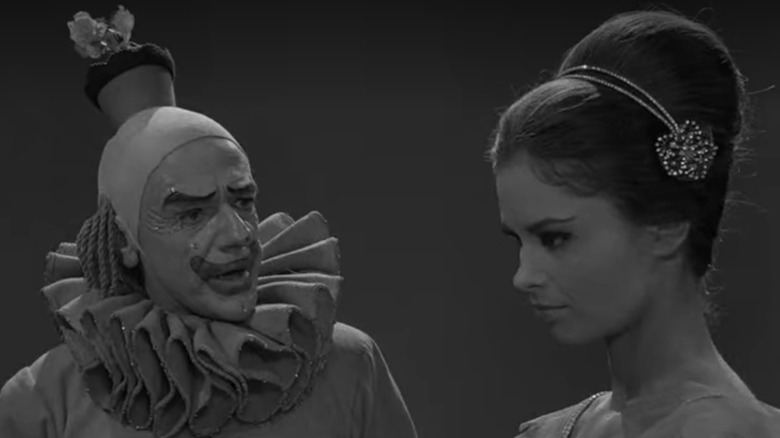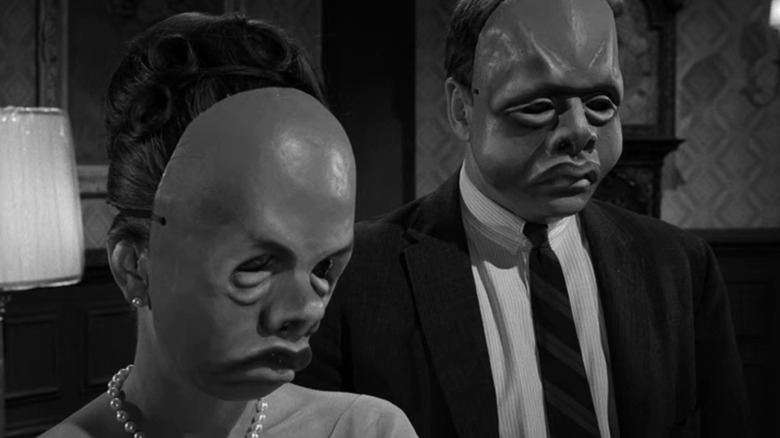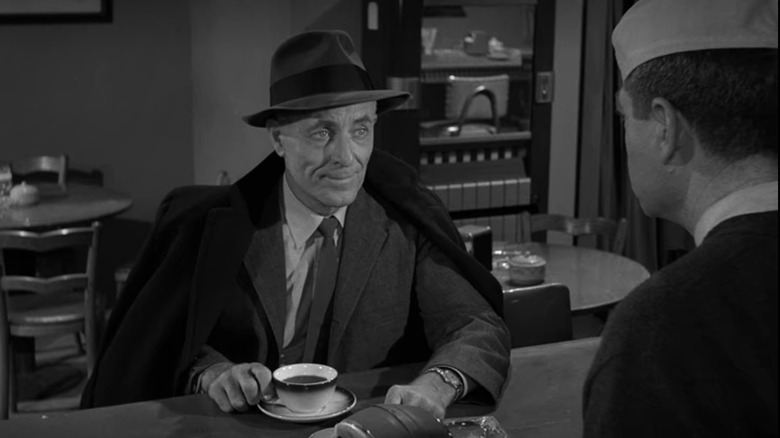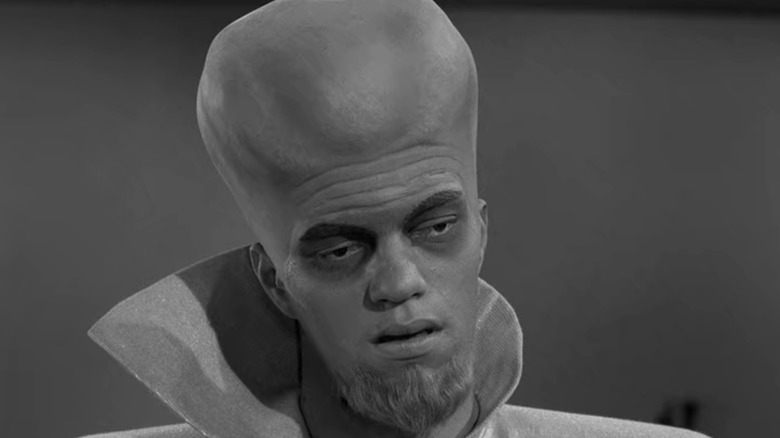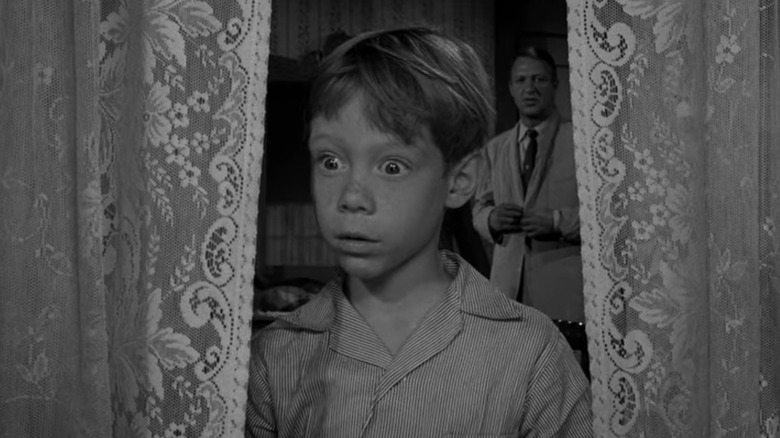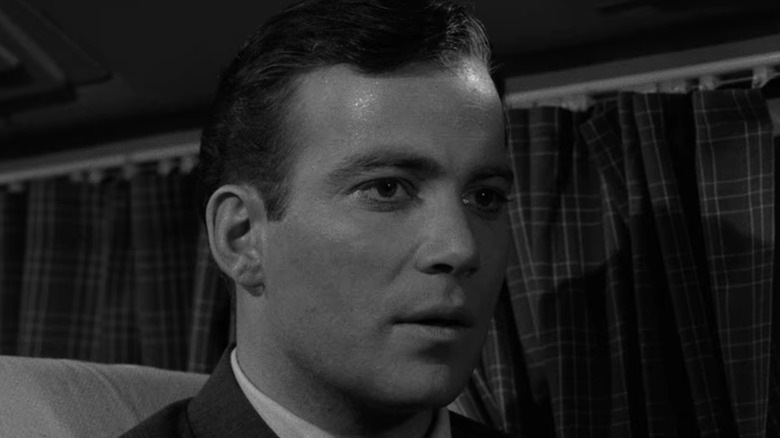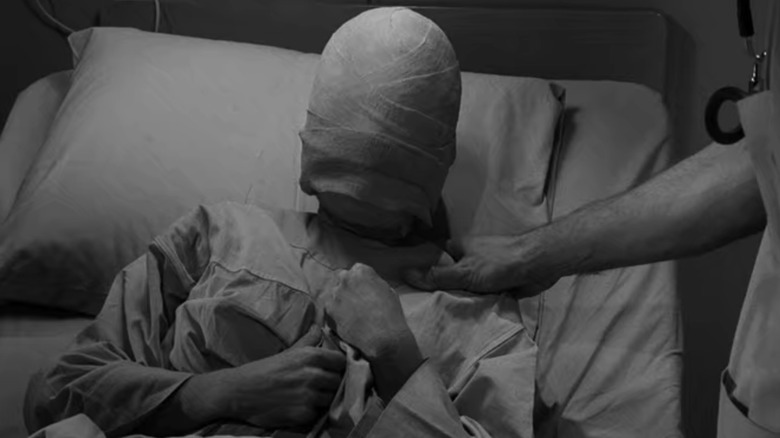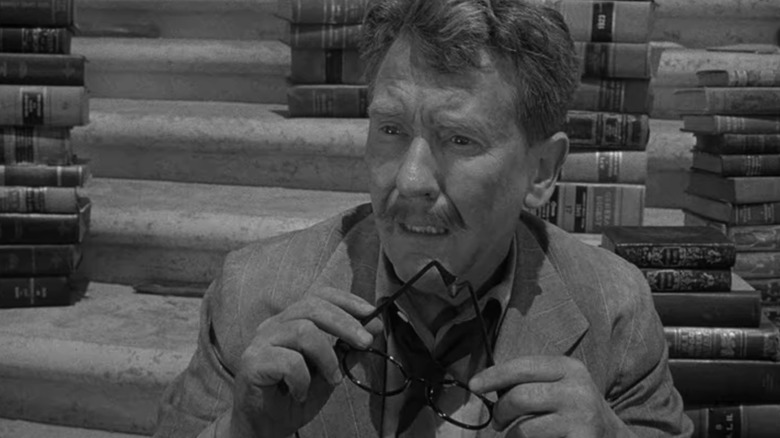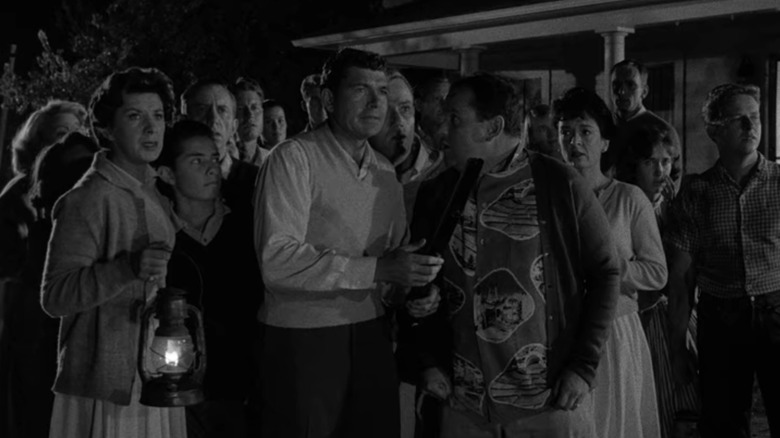30 Best Twilight Zone Episodes Ranked
From 1959 to 1964, the original "Twilight Zone" — hosted by Rod Serling — delighted and unsettled viewers with episodes that could be scary, mind-bending, provocative, and even sweet. Chances are, you still remember some of those famous plots and twist endings. And if you don't, you've seen them referenced or parodied numerous times, or you've seen other shows and movies that were influenced by them. By this point, "The Twilight Zone" is part of the collective culture.
But it's more than a television landmark. It's also an incredibly enjoyable series, one with a range of concerns and stories that feature something for everyone. There's a reason why "Twilight Zone" holiday marathons are a long-standing tradition. This is a show you could curl up with for hours at a time. And if you want to go ahead and have a personal marathon of your own, here's a ranking of 30 episodes we'd suggest including.
30. Number 12 Looks Just Like You (Season 5, Episode 17)
"Number 12 Looks Just Like You" is a sharply written dystopian tale about the pressure to conform — in looks, in mood, and in beliefs. Marilyn (Collin Wilcox) is 18 years old, and on her next birthday, she can choose which "pattern" she wants. In other words, she can pick what model of generically beautiful adult body she'll have. The only problem is that Marilyn doesn't want to give up her individuality ... but she might not have a choice.
The worldbuilding in "Number 12" is full of nice touches, like how all the adults have their names sewn into their clothes to differentiate them from all the lookalikes who also chose their particular pattern. In just half an hour, this feels like both well-thought-out science fiction and a horrifying coming-of-age story.
29. A Game of Pool (Season 3, Episode 5)
What happens once you're at the top of your game? That's one of the questions explored in "A Game of Pool," where professional pool player Jesse Cardiff (Jack Klugman) takes on the legendary "Fats" Brown (Jonathan Winters) ... a legend who's been dead for years.
If Jesse loses, he'll die too, but this isn't really an episode about having to play for your life. Instead, it's about the conversation between Jesse and Fats on this long night, as they stay neck and neck with each other until the very end. It's about what makes you the best at what you do and what happens after your triumphant victory is over. Here, there's obviously a metaphysical, otherworldly twist, but anyone in a highly competitive field will recognize the universal truths of "A Game of Pool." This is a quieter "Twilight Zone" episode, and its philosophy and performances make it shine.
28. Little Girl Lost (Season 3, Episode 26)
"Little Girl Lost" takes one of the biggest parental fears — what if your child was lost, and you couldn't find them? — and uses it to explore uncertainties about the universe. It starts off simple: Tina is crying in the night, so her parents get up to check on her. But even though they can hear her quite clearly, Tina is gone.
Once "Little Girl Lost" has explained its metaphysical aspects enough to start exploring them, it works like a charm, summoning up haunting, mind-bending images and crafting a convincingly alien dimension out of a few production tricks. Add in a delightful dog, and you have a "Twilight Zone" episode that looks homey but quickly hits all the right surreal notes.
27. The Howling Man (Season 2, Episode 5)
A few years after the end of World War I, a weak and soaked-through David Ellington (H.M. Wynant) seeks shelter in a hermitage, one where the monks are reluctant to offer him any hospitality. David finds out why when he stumbles across the source of the unearthly howling that wails through the castle: The monks are holding someone prisoner.
The man (Robin Hughes) claims that head monk Brother Jerome (John Carradine) imprisoned him only out of jealousy and madness. Jerome, needless to say, offers a completely different story, saying the imprisoned man is the devil himself. And if he gets free again, the world will get much worse.
"The Howling Man" is atmospheric and full of dread, and the potency of David's dilemma and the inevitability of the ending make it pack a wallop.
26. Nothing in the Dark (Season 3, Episode 16)
"Nothing in the Dark" may be most notable now for featuring a young Robert Redford, but this surprisingly touching "Twilight Zone" episode should also be remembered in its own right. It's the story of the elderly Wanda Dunn (Gladys Cooper). Wanda has lived alone in her basement apartment for years, shut away from the world completely. She's terrified of encountering "Mr. Death," believing that he presents himself to everyone eventually, killing them with a touch. She doesn't know what form he might take, so she never takes any chances.
But when Harold Beldon (Redford) is shot outside her apartment and left lying in the snowy, deserted street, Wanda can't bring herself to let him die. She brings him inside, amazed at how she can touch him without dying. He's evidently safe ... but does that really mean she's wrong about Mr. Death? This is a gentle, tender episode, one that proves the show's ultimately warm heart.
25. Mirror Image (Season 1, Episode 21)
Mirrors are fundamentally eerie. Don't believe us? Watch the most jolting scene in "Mirror Image."
Vera Miles plays Millicent Barnes, a young woman stuck at a bus stop in the small hours of the morning. Something's wrong — whatever she does, people keep telling her it's the second (or third or fourth) time she's done it. It's like reality itself is playing tricks on her. To try to clear her head, she goes into the restroom to splash some water on her face, and as the door swings behind her, she sees a doubled reflection. She's standing at the sink ... but she's also sitting back on the bench.
"Mirror Image" alludes to parallel realities, but the idea of your double slowly intruding into your life and taking it over doesn't need any scientific backing to be sinister. The uncanny, nightmarish quality of this episode makes it get right under your skin.
24. Nick of Time (Season 2, Episode 7)
William Shatner's best-remembered "Twilight Zone" role is in "Nightmare at 20,000 Feet," but no one should miss his turn in Season 2's "Nick of Time."
He plays Don Carter, a newlywed taking his bride to New York for a honeymoon. Their car breaks down, forcing them to kill time in a little diner where the superstitious Don can't resist playing with the fortune-teller machine on the table. (The devil's head on it should have warned you, Don.) After a few cryptic but convincingly accurate answers, he has trouble tearing himself away ... but the costs of trying so frantically to scope out their futures may be more than he can pay.
This is a simple, deliciously tense premise completely sold by Shatner and Patricia Breslin.
23. Shadow Play (Season 2, Episode 26)
One of the smartest and most viscerally unsettling episodes of "The Twilight Zone," "Shadow Play" asks two questions most of us would rather not think about: What if, night after night, you dreamed of your own execution? Or what if you were only a character in someone else's dream?
That's the situation the characters of "Shadow Play" find themselves in. Death Row inmate Adam Grant (Dennis Weaver) struggles to get the people around him to understand that this is all his horrible recurring nightmare and that his death will mean theirs. Weaver turns in a great, nervy performance, but what really makes this episode work is how it plays with audience expectations. Grant can point out all the little ways the world around him is too convenient, too streamlined, and they're all part of how TV shows and movies normally work.
"Shadow Play" is as thought-provoking as it is compelling, and it's definitely an episode you'll keep thinking about long after the credits have rolled.
22. The After Hours (Season 1, Episode 34)
If you've seen "The After Hours," you remember it. This is the one with the mannequins.
Marsha White (Anne Francis) goes to a department store to buy a present for her mother, and a special express elevator takes her to a deserted ninth floor where an odd, coolly charismatic saleswoman (Elizabeth Allen) already knows her name. It probably won't surprise you that Marsha soon learns that the store's employees insist there is no ninth floor — and she can see for herself what's wrong with the saleswoman.
As creepy and nail-biting as parts of "The After Hours" are, the story goes on to become surprisingly, wistfully human. The joy of this isn't all in the surprise; it's also in the discovery.
21. A Stop at Willoughby (Season 1, Episode 30)
"A Stop at Willoughby" looks at a man who's fundamentally ill-suited for the world he's in. Gart Williams (James Daly) is an advertising executive, but he's just not meant for a high-powered life governed by what his boss calls the need to "push, push, push." And things aren't any better at home, where his icy wife (Patricia Donahue) derides him for his sentimentality and sensitivity.
But when he dozes off on the train, Gart keeps having dreams of stopping in an idyllic little town called Willoughby. It's a quaint and sunny place somewhere in the past, and the rhythms of life seem more relaxed there — perfect for Gart. But what would it mean to escape there? The result is both poignant and interestingly ambiguous.
20. And When the Sky Was Opened (Season 1, Episode 11)
"And When the Sky Was Opened" has one of the most fundamentally disconcerting premises in the whole "Twilight Zone." After an experimental flight — one where the plane dropped off the radar for 24 hours — the pilots return as celebrated heroes ... or do they? Colonel Forbes (Rod Taylor) insists that there was a third man on the plane, Colonel Harrington (Charles Aidman), and now, there's no proof he ever existed at all. Reality has been overwritten to remove Colonel Steve Harrington completely, and only Forbes knows the difference.
The episode's eerie plot is well-served by the raw emotion we get from Forbes, who's genuinely distraught over all the confusion and the loss of his friend. And as the story speeds to its inevitable conclusion, we can't help getting goosebumps.
19. The Hitch-Hiker (Season 1, Episode 16)
As eerie and chilling as a good campfire tale, "The Hitch-Hiker" catches a ride with Nan Adams (Inger Stevens), a young woman on a cross-country drive. She passes a hitchhiker (Leonard Strong), who's a little drab and mousy, with a plain and placid face, so he should seem benign — except everywhere she goes, no matter what route she takes, he's already there. Always with his thumb out. Always waiting for her. Soon, she starts to crack under the pressure.
"The Hitch-Hiker" is simple in a way that makes it universal. On a long and lonely drive, it's hard not to think about it — and even harder not to shiver.
18. The Lonely (Season 1, Episode 7)
"The Lonely" looks at a kind of futuristic solitary confinement. James Corry (Jack Warden) is a convicted criminal, sentenced to 50 years of isolation on an uninhabited asteroid. He only finds solace in the occasional supply visits, when the sympathetic Allenby (John Dehner) smuggles him additional gifts.
One of those gifts is Alicia (Jean Marsh), a robot designed to look and act like a human woman. How real is she? Will loving her help Corry or make him lose what's left of his sanity? And what happens on Allenby's next visit, when he offers Corry a shocking choice?
"The Lonely" is made especially great by its ending, which has no real twist — just the characters having to live with the complex muddle of everything that's happened. They don't know how to feel about it, and neither do we.
17. Walking Distance (Season 1, Episode 5)
Nostalgia is understandable, but does it really lead you anywhere good? "Walking Distance" explores that question in a nuanced and unsentimental way. Stressed ad agency VP Martin Sloan (Gig Young) takes a country drive and winds up stopping at a service station close to his old hometown, which he hasn't visited in years. Impulsively, he strolls on in ... and finds himself walking into his own childhood. It's a world of ice cream sodas and carousels and bandstands, and all Martin wants to do is sink into it. But he frightens his childhood self and confuses and alarms his parents, leading him to find out that it's not that simple.
"Walking Distance" will resonate with anyone who's ever wearily longed to go back to a simpler time in their life. Its firm — but compassionately expressed — stance on the danger of too much nostalgia gives this episode considerable staying power.
16. The Midnight Sun (Season 3, Episode 10)
In "The Midnight Sun," a change in Earth's orbit means there's no more night. The weather is boiling hot, and humanity's future can be measured in months at the most. New York is slowly emptying out, but at least two people are left — painter Norma (Lois Nettleton) and her landlady, Mrs. Bronson (Betty Garde). They do their best to support each other, sharing their few resources and keeping each other company. Meanwhile, every day, it gets hotter.
"The Midnight Sun" shows us an apocalypse where nothing can be done. There's no fight to save the world. Death is inevitable, and it's coming quickly. In the face of that, the way Norma and Mrs. Bronson continue showing each other compassion seems more meaningful than ever. Despite this episode's bleakness, its softer view of humanity gives it a kind of beauty, and that complexity places it squarely on the top tier of "Twilight Zone" episodes.
15. The Silence (Season 2, Episode 25)
Unlike most "Twilight Zone" episodes, "The Silence" doesn't have any supernatural or science fictional elements. What it has instead is a diabolical plot — farfetched but, if you buy in, completely engrossing.
Colonel Archie Taylor (Franchot Tone) is so irritated with the constant chatter of a young man in his club that he suggests an outlandish wager. If Jamie Tennyson (Liam Sullivan) can stay silent for one year — in a glass cell in the club's basement; just go with it — then Colonel Taylor will give him $500,000, money that Tennyson desperately needs due to his beloved wife's intemperate spending. But as Tennyson proves more resilient in his silence than Taylor ever expected, a troubling possibility emerges: Taylor may not have the money to cover his bet.
Part psychological thriller and part tragedy, "The Silence" breaks the usual "Twilight Zone" mold to excellent results.
14. The Obsolete Man (Season 2, Episode 29)
"The Obsolete Man" is a dystopian nightmare that's also pure narrative satisfaction. The totalitarian state has declared librarian Romney Wordsworth (Burgess Meredith) to be obsolete, a cog not fit for the machine. His religious faith and his love of books mark him as an unwanted anachronism in a society that has no use for freedom of thought. In 48 hours, Wordsworth faces execution, but he gets to choose exactly when and how he will die. And he has an unusual request.
We don't want to spoil anything about this episode, which has particularly strong storytelling. We'll just recommend it as one of the best episodes of "The Twilight Zone," making it anything but obsolete.
13. Living Doll (Season 5, Episode 6)
In "Living Doll," a new toy sends an already dysfunctional family straight into the Twilight Zone. Erich (Telly Savalas) takes out his personal frustrations by launching into tirades and withholding love from his stepdaughter, Christie. But in Christie's new doll, Talky Tina, Erich has met his match. She looks like an ordinary toy, but when she's alone with Erich, she says things like, "My name is Talky Tina, and I don't think I like you."
We're not used to rooting for terrifying talking dolls. But while "Living Doll" plays off horror tropes, Talky Tina is closer to a protector or an avenger than she is a menace. (Although, as the end suggests, it may be best to stay on her good side.) The real monster in "Living Doll" is emotional abuse, and it's explored with a satisfying combination of scares, sensitivity, and wish fulfillment.
12. The Shelter (Season 3, Episode 3)
Welcome to the world's most disastrous birthday party. The celebration is for Dr. Bill Stockton (Larry Gates), a well-loved family physician whose carefully constructed bomb shelter gets some gentle razzing from his neighbors ... until the radio says they may be on the brink of nuclear war. The cake is forgotten as everyone scatters in panic, but they all come back to the Stocktons'. Theirs is the only fallout shelter around. And the neighbors will rip each other to pieces to make sure they're the ones who get inside.
Like "The Monsters are Due on Maple Street," "The Shelter" reveals how ugly people can get when things go wrong. The convivial birthday party is only minutes away from becoming a mob. This dark little lesson in the effects of panic is elegantly, hauntingly effective.
11. An Occurrence at Owl Creek Bridge (Season 5, Episode 22)
"An Occurrence at Owl Creek Bridge" both is and isn't a "Twilight Zone" episode. As Rod Serling explains in his introduction, the episode is actually an award-winning French film that he wanted to present as part of the series. And it's easy to see why this historical piece spoke to him.
Peyton Farquhar awaits execution at the hands of the Union Army. The process of getting the noose around his neck and setting up the eerily whimsical seesaw drop seems to go on forever — and then Farquahr is hanged. And the rope snaps, sending him plunging into the river. Even with his escape uncertain and the Army still pursuing him, he can't help noticing and luxuriating in the natural world around him. For the first time, he really feels all the pleasures of being alive. But as fast he runs, he can't escape the Twilight Zone.
Lean, effective, and beautifully shot, this one may not have started in the "Twilight Zone" writers' room, but it certainly belongs on the show.
10. The Invaders (Season 2, Episode 15)
Agnes Moorehead stars in "The Invaders," where a UFO manned with tiny invaders lands on her rustic, out-of-the-way farmhouse. Her performance is great — wordless but full of expressive body language, grunts of exertion, and moans of terror. It puts you right in her shoes as she struggles to fight off these small alien intruders. The squat little figures could be comical, but the episode makes them convincingly terrifying. And it helps that the house has no electricity, so the invaders have plenty of shadows to hide in. Moorehead's wobbly candlelight almost becomes a character in its own right.
This tense siege thriller is as riveting as any horror movie, and it finishes off with a classic "Twilight Zone" twist.
9. Five Characters in Search of an Exit (Season 3, Episode 14)
An Army major wakes up to find himself imprisoned in a round, featureless room. His companions — a clown, a ballet dancer, a hobo, and a bagpiper — have all been there much longer, and they've wearily accepted their confinement and all the strangeness that comes with it. None of them know their names or remember their pasts. None of them need to eat, drink, or sleep. Every once in a while, an enormous bell rings outside their prison.
What is going on? Who are they? What are they doing there? The major (William Windom) can't accept that they just don't know, and eventually, he hits on an idea that may let them see over the room's wall.
"Five Characters in Search of an Exit" puts an existentialist spin on an old flight of fancy, making it one of the signature "Twilight Zone" episodes.
8. The Masks (Season 5, Episode 25)
"The Masks" is a classic morality fable, and its simplicity is part of its effectiveness. Robert Keith plays Jason Foster, an elderly, cantankerous man who knows he has only a few more hours to live. His family has gathered around him, but they're not there to comfort him. They're there to watch the clock, counting down the minutes until they can get their hands on his money.
Jason proposes a Mardi Gras celebration of their own, one that comes with hideous masks that express what's already lurking inside his family — greed, vanity, cowardice, and cruelty. For a few short hours, their faces will tell who they really are. And once the clock strikes midnight, they can leave the masks behind and walk away with a fortune. Or can they?
With strong acting and some very creepy props, "The Masks" shows how well "Twilight Zone" could do pure horror, and it jumps up the list of our top episodes.
7. Will the Real Martian Please Stand Up? (Season 2, Episode 28)
"Will the Real Martian Please Stand Up?" is set almost entirely in a little roadside diner, where bus passengers are grabbing a bite to eat and a cup of coffee before they get back on the road. But there's a wrench thrown into the works. A UFO seems to crash-land in a nearby pond, and there are footsteps in the snow — footsteps that go straight from the pond to the diner. And while there were only six passengers on the bus, there are seven in the restaurant. They all claim they belong, but did one of them catch a different kind of ride?
"Will the Real Martian Please Stand Up?" is a playful episode that turns out to have an unexpected bite to it.
6. To Serve Man (Season 3, Episode 24)
Beware of aliens bearing gifts. When the tall, telepathic Kanamits appear with technological solutions to all of Earth's problems, they claim their only motive is disinterested benevolence. And who could remain skeptical for too long, when they make arid land blossom and provide each nation with an unbreakable force field? But there's a fault in all this perfection — something that hangs on the translation of a text one of the Kanamits left behind.
"To Serve Man" has one of the show's best endings, with a stinger that almost acts as a punchline, turning the whole episode into a very dark — and very memorable — joke.
5. It's a Good Life (Season 3, Episode 8)
Kids are great. But they can also be capricious, impulsive, and destructive. Their curiosity encompasses wonder and imagination, but it can also lead to questions like, "What happens if I aim this magnifying glass at an ant?"
"It's a Good Life" knows all of this, and it uses it as the backdrop to what might be the series' scariest episode. It stars Anthony (Billy Mumy), a 6-year-old boy with nearly godlike powers. Anthony can do whatever he wants, so the miserable adults around him need to keep up their fixed smiles and make sure to think happy thoughts.
It's hard to think of a worse situation to be stuck in, and the actors all do a great job conveying their exhaustion and despair. This is as dark as "The Twilight Zone" gets, and we just hope Anthony doesn't learn we ranked it just a little shy of the No. 1 spot.
4. Nightmare at 20,000 Feet (Season 5, Episode 3)
Since "Nightmare at 20,000 Feet" is so iconic, it's easy to think that the original episode may have lost some of its power through overexposure. But trust us, this is as well-constructed and gripping as ever.
William Shatner plays Robert Wilson, a man returning home after a stint in a psychiatric hospital. His previous breakdown happened on an airplane, making this flight feel like a test of his new stability. He's anxious to prove that everything's fine now. But then, as you probably know, he sees a mysterious creature on the wing of the plane.
Yes, the gremlin in this episode is unmistakably a man in a furry costume. But it really doesn't matter. The important part of the episode is Robert's dilemma. How much does he trust himself? What will happen if he doesn't intervene? This high-stakes human drama (and the paranoia and tension that come with it) makes "Nightmare at 20,000 Feet" an immortal episode.
3. Eye of the Beholder (Season 2, Episode 6)
"Eye of the Beholder" is one of the most famous "Twilight Zone" episodes ever and with just cause. Even if you guess the twist — or, for that matter, go in spoiled by decades of pop culture references — you're still left with a tour de force of an episode, one grounded in strong performances, clever direction, and thought-provoking themes.
Janet (played by Maxine Stuart and Donna Douglas) is on her eleventh hospital stay. Her face is swathed in bandages, and she's stuck in limbo, waiting to know if this time — on the last try she's legally allowed — she will be "normal" instead of "ugly." If this latest treatment doesn't adjust Janet's features, then she's out of options. She can go into exile with "others of her kind" ... or she can be executed by a state so obsessed with conformity that doubting its value qualifies as treason.
"Eye of the Beholder" is a quintessential "Twilight Zone" episode that shapes what the show means to people.
2. Time Enough at Last (Season 1, Episode 8)
"Time Enough at Last" centers on the mild-mannered Henry Bemis (Burgess Meredith). The consummate bookworm, Henry reads whenever he can get the chance, which isn't very often. Everyone around him looks down on his passion for books. His wife (Jacqueline deWit) even takes pleasure in destroying them just to vent her frustrations at having a husband who reads poetry and doesn't fit the right suburban and professional mold.
But then, in a twist of fate, Henry is the lone survivor of a nuclear blast. Lonely and despairing, he decides he doesn't want to live in this desolate world — but then he sees the public library. So many of the books are still intact. He still has books! And he has all the time in the world now!
If you don't know the ending of "Time Enough at Last," we won't spoil it for you. Let's just say that it's maybe the most famous in the series ... and that while "The Twilight Zone" sometimes doles out cosmic justice, sometimes fortune is, alas, random.
1. The Monsters Are Due on Maple Street (Season 1, Episode 22)
A sadly timeless allegory, "The Monsters Are Due on Maple Street" is a study of how swiftly and brutally we can descend into suspicion, scapegoating, and violence. The suburban Maple Street is as ordinary as can be ... until a mysterious, humming shape flashes overhead, and the lights go out. Even the cars won't start. When a boy insists that he's read stories just like this one, stories about alien invaders who look just like us, everyone laughs it off — at first.
But soon, the people of Maple Street start pointing fingers. Stargazing and ham radios are dragged out as evidence of questionable behavior, proof that someone is not "like us." It gets even worse once things start working again. Why is he so special that his car gets to start? Why did the power come back on at their house?
"The Monsters Are Due on Maple Street" obviously works as a fable about McCarthyism, but it can apply equally well to more current situations. Until people learn better, this one will feel universal, and it hasn't lost any of its potency yet.
